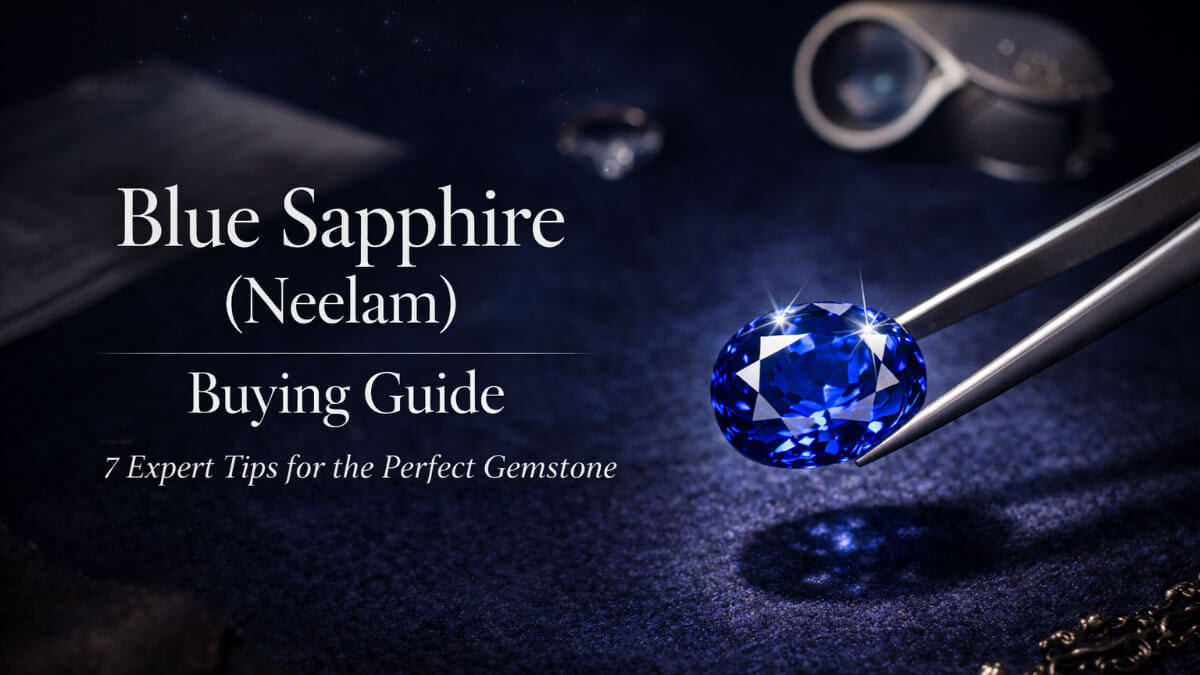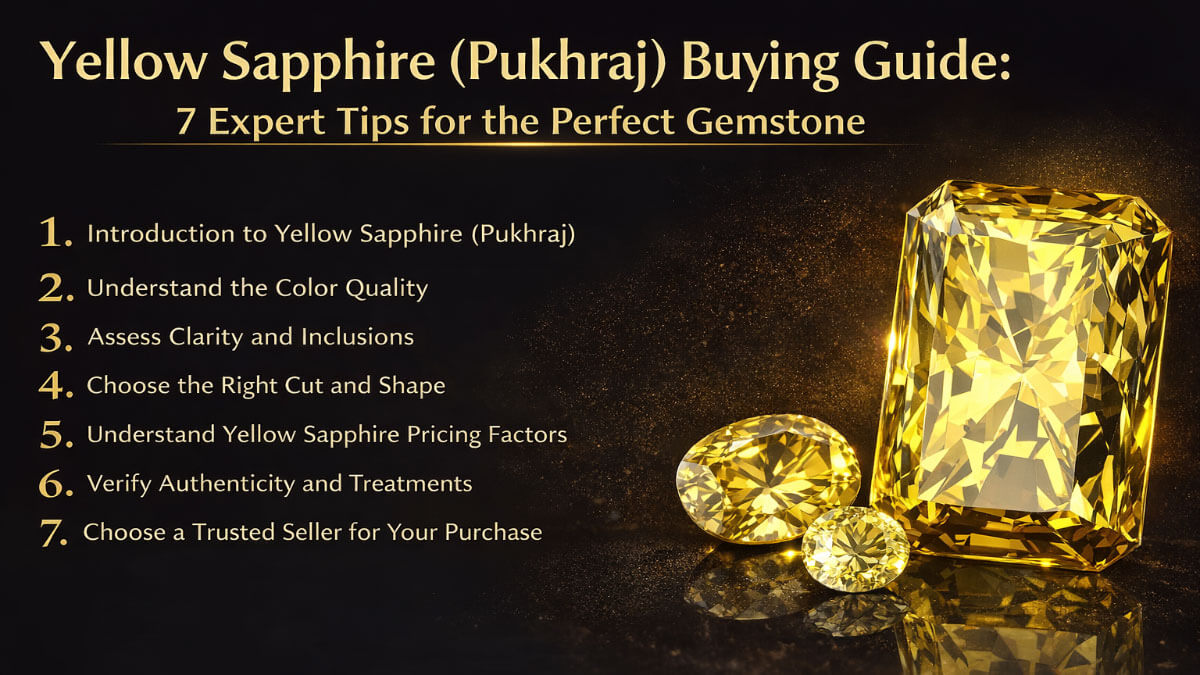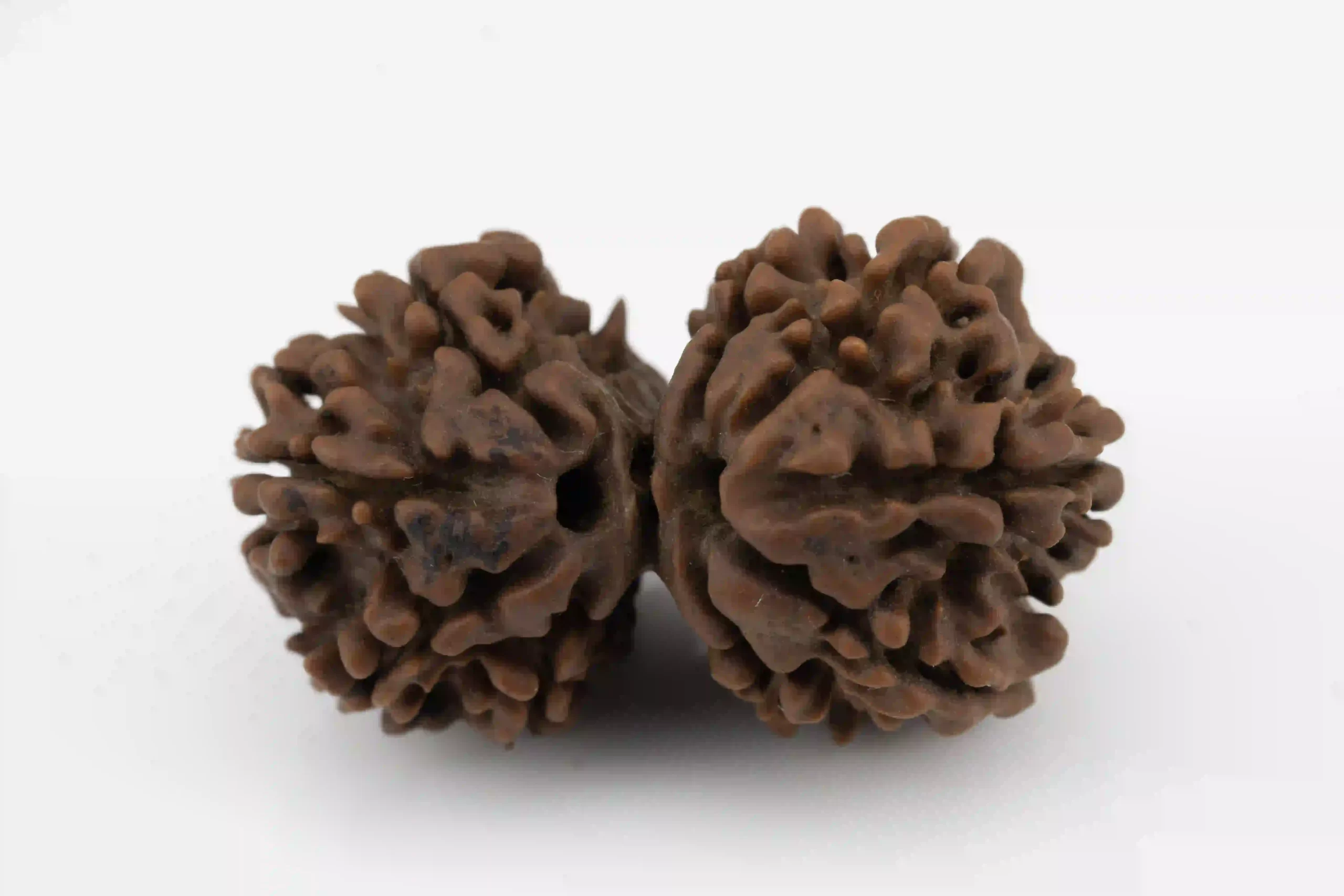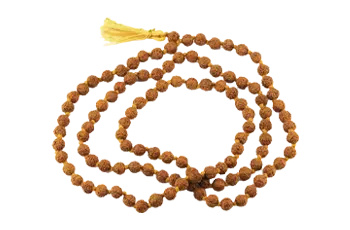Ceylon Sapphires vs. Bangkok Sapphires: The Ultimate Comparison Guide
When choosing a sapphire, the debate of Ceylon Sapphires vs. Bangkok Sapphires is one of the most critical conversations in the gem world. One origin is revered for its brilliant, lively colors, while the other is known for its deep, intense hues. For buyers in India, especially those purchasing for astrological reasons, understanding this comparison is key. This expert guide provides an in-depth analysis of their history, characteristics, treatments, and astrological significance, helping you make an informed and confident decision.
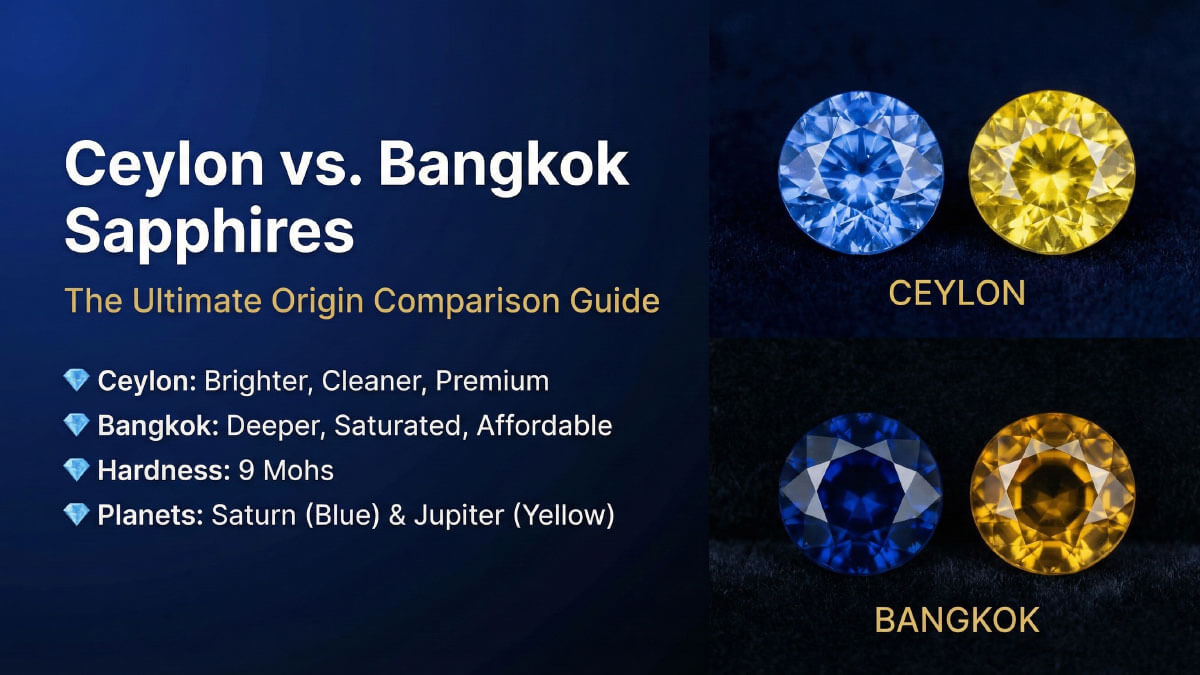

Sapphire at a Glance
| Gemstone Family | Corundum |
| Key Varieties | Blue Sapphire (Neelam), Yellow Sapphire (Pukhraj) |
| Ruling Planets | Saturn (for Blue), Jupiter (for Yellow) |
| Hardness | 9 on the Mohs Scale (Excellent for daily wear) |
Understanding Sapphire Treatments: Heat, Diffusion, and Glass Filling
Understanding treatments is the most critical part of the Ceylon Sapphires vs. Bangkok Sapphires debate. Not all treatments are equal.
- Standard Heat Treatment: This is a common and stable process where sapphires are heated to high temperatures to improve their color and clarity. This is a permanent enhancement and is widely accepted in the gem trade for both Ceylon and Bangkok sapphires.
- Beryllium Diffusion: This is a more intense form of heat treatment where the element beryllium is introduced to create or intensify color, especially in yellow and orange sapphires. This should be disclosed on a gem certificate.
- Glass Filling: This is a non-permanent treatment used on low-quality, heavily fractured sapphires. Cracks are filled with a high-lead-content glass to improve apparent clarity. These stones are not durable, can be damaged by common household chemicals, and are significantly less valuable.
Crucial Buyer Information: While Bangkok is a hub for cutting beautiful sapphires, it is also known as a major center for treating very low-quality material with glass filling. Always demand a certificate to ensure you are not buying a glass-filled stone.
Ceylon Sapphires vs. Bangkok Sapphires: A Detailed Comparison
Let’s break down the key differences between these two famous sapphire types. For more authoritative information, you can always refer to the Gemological Institute of America (GIA).
Side-by-Side Analysis
| Characteristic | Ceylon (Sri Lankan) Sapphire | Bangkok (Thai) Sapphire |
|---|---|---|
| Color | Brighter, more brilliant “cornflower” to royal blue. Yellows are a vibrant “canary” yellow. | Deeper, more saturated, sometimes inky blue. Yellows are often a deep “whiskey” or golden-honey color. |
| Clarity | Generally has higher clarity with fewer inclusions. Known for being exceptionally clean. | Clarity can vary. Often has more inclusions, which are made less visible by the deep color. |
| Luster | Famous for its superior, lively brilliance and sparkle. | Has a good luster, but it can sometimes be subdued by the very deep and dark body color. |
| Treatment | Often requires only low-level heat treatment, and unheated stones are more common. | Almost always subjected to high-temperature heat treatment to develop its deep color. Risk of glass-filling in lower-quality stones. |
| Astrological Preference | Highly preferred due to its natural brilliance and often minimal treatment. | Considered effective, but only if it is a certified, heat-treated stone, NOT glass-filled. |
| Price | Commands a premium price, especially for unheated stones. The ceylon yellow sapphire price is a benchmark for quality. | Generally more affordable than Ceylon sapphires of comparable size. |
Making the Right Choice: Which Sapphire Should You Buy?
- For the Astrological Purist: An unheated or minimally heated Ceylon sapphire is the undisputed top choice. Its natural brilliance and purity are considered most effective for astrological purposes.
- For the Jewelry Enthusiast: If you love a deep, intense, and saturated color, a certified, heat-treated Bangkok sapphire can be a stunning and more affordable choice for a piece of jewelry.
- For the Best of Both Worlds: A high-quality, certified heated Ceylon sapphire offers a fantastic balance of brilliant color, excellent clarity, and strong astrological energy.
Why Trust Ratna Gems™ for Your Sapphire?
At Ratna Gems™, we are committed to providing authentic, high-quality astrological gemstones with complete transparency. We are your trusted source because we offer:
- Certified Authentic Sapphires: Every sapphire is certified by a recognized lab, detailing its origin and all treatments. We do not sell glass-filled stones.
- Transparent and Honest Pricing: We offer competitive prices for both Ceylon and Bangkok sapphires with full disclosure on quality.
- Unmatched Customer Support: Our experts are here to guide you, and our 7-day return policy ensures your complete satisfaction.
Frequently Asked Questions
Which yellow sapphire is more effective: Bangkok or Ceylon?
For astrological purposes, a Ceylon Yellow Sapphire (Pukhraj) is almost always preferred. Its natural brilliance and minimal treatment are believed to carry purer astrological energy. However, a high-quality, certified Bangkok sapphire can still be effective if recommended by an astrologer.
Is a heated Ceylon sapphire better than an unheated Bangkok sapphire?
Generally, yes. A high-quality Ceylon sapphire that has only undergone standard heat treatment is considered superior to a lower-quality, unheated Bangkok sapphire. The overall quality (color, clarity, cut) of the Ceylon stone is typically higher to begin with.
How can I spot a glass-filled sapphire?
Glass-filled sapphires often have a very high luster that can look “too good to be true.” Under magnification, you may see tiny gas bubbles or a “flash effect” of blue and orange flashes within the cracks. A lab certificate is the only way to be certain.
How can I tell the difference myself?
While an expert can often tell by the nature of the color and luster, the only certain way for a buyer to know the origin and treatment of a sapphire is through a certificate from a reputable gemological laboratory like GIA or GRS.
